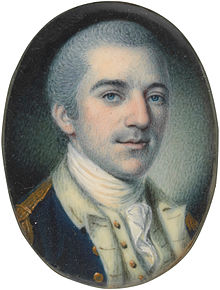John Laurens
| John Laurens | |
|---|---|

A 1780 miniature portrait of Laurens, by Charles Willson Peale
|
|
| Nickname(s) | Jack, Jacky (by family) |
| Born |
October 28, 1754 Charleston, Province of South Carolina, British North America (now Charleston, South Carolina, U.S.) |
| Died | August 27, 1782 (aged 27) Combahee River, South Carolina, U.S. |
| Buried at | Laurens Family Cemetery, Mepkin Abbey Moncks Corner, South Carolina, U.S. |
| Allegiance |
|
| Service/branch | Continental Army |
| Years of service | 1777–1782 |
| Rank |
|
| Battles/wars |
|
| Spouse(s) | Martha Manning Laurens (1757–1781) |
| Relations |
|
| Signature | |
John Laurens (October 28, 1754 – August 27, 1782) was an American soldier and statesman from South Carolina during the American Revolutionary War, best known for his criticism of slavery and efforts to help recruit slaves to fight for their freedom as U.S. soldiers.
Laurens gained approval from the Continental Congress in 1779 to recruit a brigade of 3,000 slaves by promising them freedom in return for fighting. He was killed in the Battle of the Combahee River in August 1782.
Laurens was born in 1754 to Henry Laurens and Eleanor Ball in Charleston, South Carolina; both their families were planters who had grown wealthy through cultivation of rice. Henry Laurens ran one of the largest slave trading houses in the country with his partner Richard Oswald.
John was the eldest of the five children who survived infancy. John and his two brothers were tutored at home, but after the death of their mother, their father took them to England for their education. John completed his studies in Europe, first in London in 1771, then in Geneva, Switzerland in 1772. As a youth, John expressed considerable interest in science and medicine, but he yielded to his father's wish that he study law. In August 1774 he returned to London to do so.
His father returned to South Carolina but refused to let John return until completing his legal studies two years later. In the summer of 1777, after the Revolutionary War had started, Laurens accompanied his father to Philadelphia, where the senior man was to serve in the Continental Congress. Despite the father's objections, the younger Laurens continued on to General George Washington's camp as a volunteer at the age of 23.
...
Wikipedia
